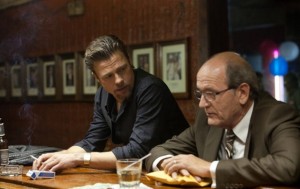Criminals and Thugs, High and Low
Dir. Andrew Dominik, with Brad Pitt, James Gandolfini, Ray Liotta and Richard Jenkins
The latest “Brad Pitt movie,” Killing Them Softly, directed by Andrew Dominik, is a heist-gone-bad film, and a real oddity: a gritty thriller with something serious to say. An update of George V. Higgins’ 1974 novel, Cogan’s Trade, this adaptation is set in 2008 just prior to the presidential election. The film plays out entirely on the dark, rainy, mean streets of New Orleans, or rather in back rooms and sedans, but the backdrop is the massive crisis in the world banking system.
Four-time Academy Award nominee Brad Pitt’s lengthy film resume goes back to 1987 (an uncredited role in Hunk as “Guy at Beach with Drink”). The Australian director Andrew Dominik, in contrast, with three feature films over a twelve year span to his credit, actually worked with Pitt previously, on Dominik’s second film, the long, moody western, The Assassination of Jesse James by the Coward Robert Ford (2007). Interestingly, although the earlier film was mainly a psychological study of celebrity train robbers and their sycophants, and was as long and slow as this one is short and fast, that too was a film about economics, thievery, and public relations.
Pitt plays Jackie Cogan, an enforcer brought in to clean up the mess after two bungling fools, hired by a third, marginally smarter fool, hold up a local poker game run by mobster Markie Trattman (Ray Liotta). The trio think they can get away with it because – trying not to give away too much of the fun stuff here – there is a history of robbery of this same card game that is “guaranteed” to direct attention elsewhere. This ingenious device has the effect of making the mob’s real problem not one of literal guilt, innocence, or fairness, but a PR problem of managing public perceptions and reestablishing confidence in the street-level economic system itself.
Cogan’s employers, known only through the unnamed go-between (Richard Jenkins) who hires him, are apparently an ineffectual, penny-pinching bunch of corporate middle-manager types who think like a committee. Cogan, not without his foibles, doesn’t like “hitting” people he actually knows, because it can get messy and emotional. So for the one target he knows personally he brings in an outsider, Mickey (James Gandolfini), an alcohol-and-whore-addled waste who turns out to be at least two years past his prime. It’s shocking to see Tony Soprano reduced to this sad wretch of a human being, which is a reminder of just how good an actor Gandolfini really is. But business is business. Mickey is sent to the showers, in a manner of speaking, and Cogan finishes the job himself. In the course of that cleanup, by the way, the film delivers some of the most stylized, elegant displays of slow-motion violence since Bonnie and Clyde.
Setting the updated narrative in 2008 is a brilliant stroke. Current events play out in the background, mostly in news broadcasts on TV and a bit on radio, with alarming reports of the economic crisis that brought the global banking system to its knees and cost US taxpayers something like $8 trillion dollars and 25 million jobs. At crucial points in the film, usually moments when Cogan is negotiating strategy and price with his mob contact, key speeches play audibly on TV screens in the background, initially by president Bush and eventually by president elect Obama.
In each of these background speeches, which take place at crucial moments in the national crisis, their emphasis is on explaining in offensively simple, duplicitous language, their version of what happened, what’s being done supposedly on our behalf, and why. Beyond the technical business aspects of the problem, the urgent goal is to restore confidence in the system itself, something both men, Bush and Obama, explicitly acknowledge. The obsession with restoring confidence at all costs makes it clear soon enough that what’s happening at one level in this brutal drama about thugs and card games is essentially the same as what’s happening simultaneously in the media, on Wall Street, and in Washington, D.C.
In an act of radical cynicism, Killing Them Softly draws a clear parallel between the world of gamblers, thieves, and killers, and the equivalent world of investment bankers and politicians. It’s an audacious, disturbing message. President-elect Obama’s acceptance speech, on a barroom TV in the background of the final scene, includes a soaring appeal to the spirit of community, national identity, and working together. Cogan himself cynically deconstructs Obama’s rhetorical flourishes on the fly, predicting them almost line by line, and throws in a stinging assault on the ethics and hypocrisy of Thomas Jefferson. “America,” he spits out, “isn’t a country, it’s a business. Now give me my money.” It’s hard not to say it: he sounds just like an investment banker.
Also published in GeneseeSun.com.
